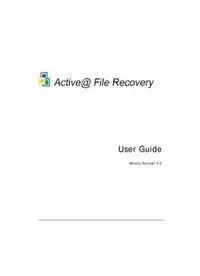
User Guide - Live CD [email protected] Data Studio - recovery toolset PDF
Preview User Guide - Live CD [email protected] Data Studio - recovery toolset
User Guide Version Number 2.0 File Recovery 2.0 END-USER LICENSE AGREEMENT Copyright (c) 1998-2002 Active Data Recovery Services. All rights reserved. IMPORTANT-READ CAREFULLY This End-User License Agreement ("EULA") is a legal agreement between you (either an individual or a single entity) and The Active Data Recovery Services for the Contents 1 OVERVIEW What Happened to my Data? ..............................................................................................................................1 Welcome to NTFS Master File Table (MFT) ........................................................................................................................41 NTFS File Types..................................................................................................................................................42 NTFS File Attributes....................................................................................................................................42 NTFS System Files .......................................................................................................................................43 NTFS Multiple Data Streams......................................................................................................................44 NTFS Compressed Files ..............................................................................................................................45 NTFS Encrypted Files (Windows 2000 only) ..........................................................................................45 NTFS Sparse Files (Windows 2000 only)..................................................................................................46 Data Integrity and Recoverability with NTFS.................................................................................................47 Recovering Data with NTFS.......................................................................................................................47 Cluster Remapping........................................................................................................................................47 6 THE FILE RECOVERY PROCESS Disk Scanning for Deleted Entries ...................................................................................................................50 Defining the Chain of Clusters..........................................................................................................................53 Recovering the Chain of Clusters......................................................................................................................55 7 THE PARTITION RECOVERY PROCESS System Boot Process ...........................................................................................................................................57 Partition Visibility..........................................................................................................................................57 Other Partition Recovery Topics ................................................................................................................58 MBR is Damaged.................................................................................................................................................59 Blank Screen on Startup...............................................................................................................................59 Operating System Not Found.....................................................................................................................60 Partition is Deleted or Partition Table is Damaged........................................................................................61 Partition Boot Sector is Damaged.....................................................................................................................63 Missing or Corrupted System Files...................................................................................................................65 Emergency Repair Process ..........................................................................................................................65 Recovery Console..........................................................................................................................................66 Recovery Software ........................................................................................................................................66 8 TROUBLESHOOTING “UNREGISTERED VERSION” Message .............................................................................................67 Maximizing Chances of Recovering Files..................................................................................................67 Getting the Trial Version .............................................................................................................................67 Restoring Files ...............................................................................................................................................67 Windows 2000, Windows XP .....................................................................................................................68 Windows 3.x ..................................................................................................................................................68 Browser Support ...........................................................................................................................................68 Non-English File Names .............................................................................................................................69 Long File Names...........................................................................................................................................69 Disk Image .....................................................................................................................................................69 Recovery Tips.......................................................................................................................................................69 OVERVIEW 1 What Happened to When a file is written to a hard drive, two separate systems come into play: my Data? • Record of that file is kept in the Root Table or Master File Table (MFT) • Physical hard drive addresses are labelled as 'occupied'. These addresses are physical locations called clusters. When file is deleted from a hard drive, the same two systems are notified: • The file record in the Root Table or MFT indicates the file has been deleted. • Clusters are labeled as 'unoccupied'. In the event of an accidental file deletion it is strongly recommended to perform the recovery operation as soon as possible. If any new files are written to the same drive, there is a chance that the file-writing process may have allocated these Welcome to 2 CHAPTER 1: OVERVIEW • Windows NT • Windows 2000 • Windows XP USING 4 CHAPTER 2: USING Searching for Deleted Files and Folders 5 Searching for Use this method when you are not certain where the deleted file or folder was stored Deleted Files and before it was accidentally deleted. If you know where the deleted file or folder should Folders be, you can use Device Scan procedure as described above. Follow the steps below: 1 Check the Windows Recycle Bin to see if the file or folder is there. If it is, use standard Windows Restore command to recover it from there. If not, continue with step 2. 2 If you are not certain where the deleted file or folder was before it was deleted, try to reduce the size of the search by not searching through those folders on the drive where you know it would not have been. 3 When you have chosen a folder where the deleted data might have been: • Click the Search button on the toolbar, or right-click the drive or folder and click Search in the context menu. • Define a search pattern in Filter Files dialog. For example, type *.TXT to find all files with “TXT” extension. Check Deleted Only to hide non-deleted files and folders. Figure 2-2 Define a Search Pattern • By default, the filter pattern is not case sensitive. If you want to make it case sensitive, enable the Match Case check box. • Click Find. After the search is complete, examine folders on the left that contain matched files The search pattern used here is the same pattern recognized when searching in Microsoft Windows.The asterisk symbol (*) in the pattern means that at this place can be zero or any number of any symbols. The question mark symbol (?) in the pattern means that at this place can be any single symbol. Some examples are listed below: * All file on the drive or in the folder *.TXT All fields with “TXT” extension My*.* All files starting with “My” MyFile.txt Search for the file named “MyFile.txt” See Also: Performing Extended Device Scan, Searching for Deleted Files and Folders 6 CHAPTER 2: USING
